Search results
Projects
Connecting Insights around Care-at-a-distance
Concept-generation workshop with Telstra
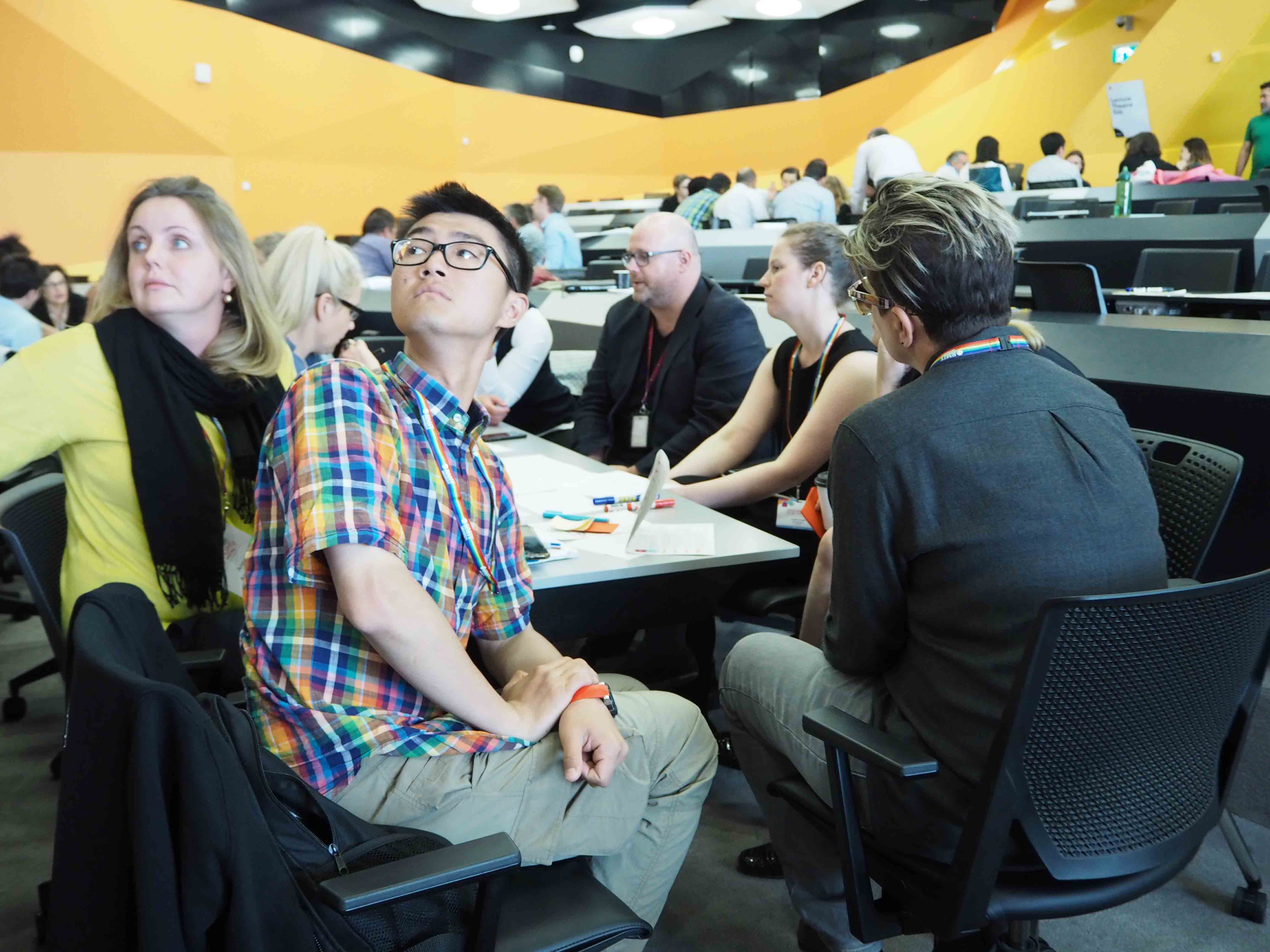
As part of the inaugural Engaging for Impact conference, the DCP ECP and Telstra ran a concept-generation workshop which brought together expertise around the creative, social, cultural, educational and ethnographic dimensions of technology and care to provide greater insights into practices now and in the future. The workshop considered some of the challenges and opportunities in the emergent fields of locative media, intergenerational care-at-a-distance, friendly surveillance and assisted living. Much of the discussion encircled key paradoxes around the following concepts:
- vulnerable agency (elderly, young children, animals);
- security and surveillance;
- privacy vs findability; and
- datafication.
If you would like to get involved with this project, fill out the form below or reach out to project leaders via the contact info provided alongside each bio.
People
Larissa Hjorth
Distinguished Professor and Director, Design and Creative Practice
School: Enabling Capability Platforms
Larissa Hjorth is a digital ethnographer, artist, Distinguished Professor and director of the Design & Creative Practice ECP platform at RMIT University. With Professor Heather Horst, she co-founded the Digital Ethnography Research Centre (DERC). Previously, Hjorth was Deputy Dean, Research & Innovation, in the School of Media & Communication (2013−2016). Hjorth served on the inaugural Australian Research Council (ARC) Engagement & Impact Pilot study assessment panel for humanities and creative practice.
Hjorth studies the socio-cultural dimensions of mobile media and play practices in the Asia-Pacific region with an emphasis on interdisciplinary, collaborative and cross-cultural approaches. She has published a dozen co-authored books, edited over a dozen Handbooks/Companions and has over 40 journal articles.
More recently, Hjorth’s work has become concerned with how we can bring creative, social and design solutions to the growing ageing populations and, in turn, how we might consider scenarios of what it means to die well. She is also studying how our “more-than-human” companions can teach us about new media in everyday life. Hjorth’s last book, Haunting Hands (Oxford Uni Press) looked at how mobile media is being deployed in situations of grief and trauma, her previous book explored how art practice can teach us new acumen into the climate change debate.
Hjorth’s books include Haunting Hands (with Cumiskey 2017), Screen Ecologies (with Pink, Sharp & Williams 2016), Digital Ethnography (Pink et al. 2016) Mobile Media in the Asia-Pacific (2009), Games & Gaming (2010), Online@AsiaPacific (with Arnold 2013), Understanding Social Media (with Hinton 2013), and Gaming in Locative, Social and Mobile Media (with Richardson 2014).
Care, Media and Ritual
Creative, social and ethnographic interventions in care
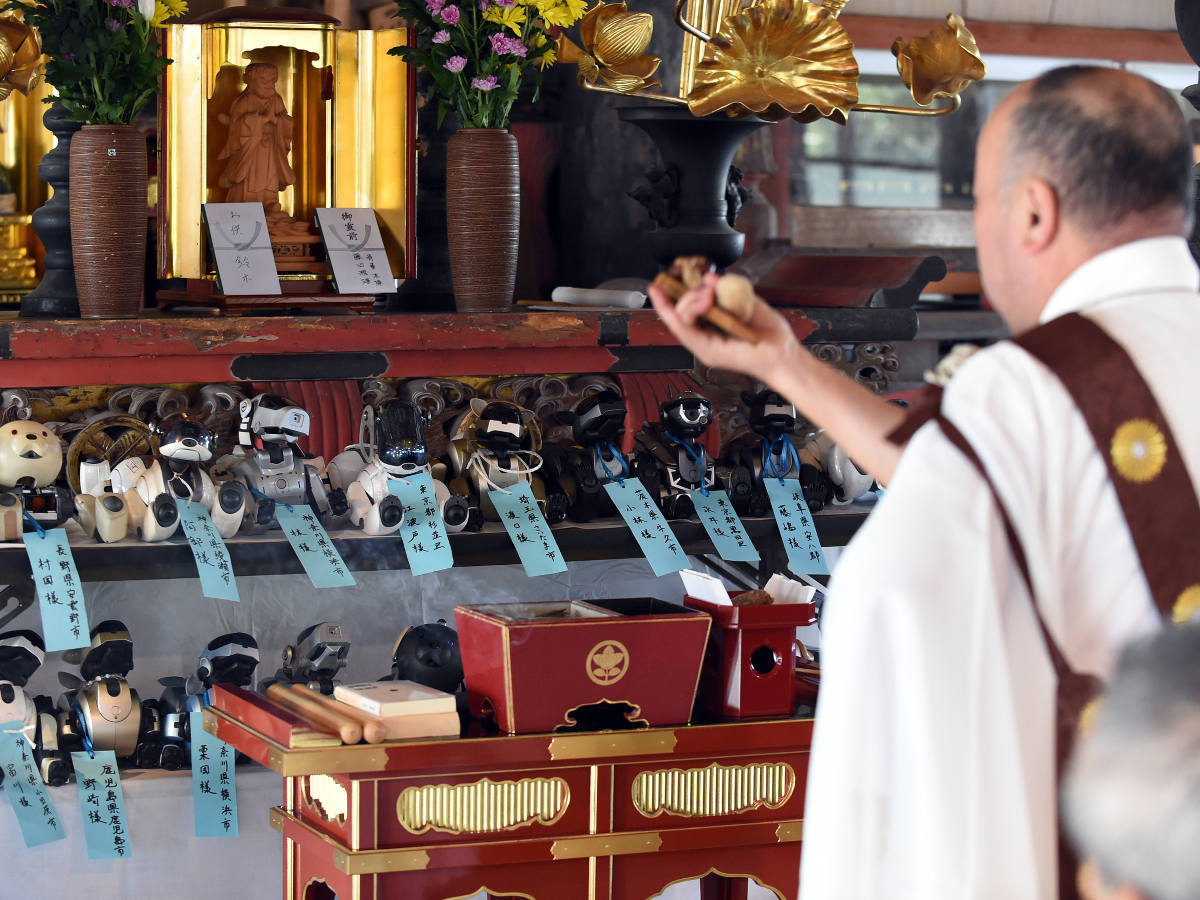
New media is increasingly mediating the role of care and ritual around ageing (and dying). For example, in Japan where a large percentage of the population is elderly, the role of care and ritual is being recalibrated. New media and digital mobile technologies are affording families new ways to care-at-a-distance. What does care, media and ritual look like when replicated by new technologies?
We’re exploring some of the practices and challenges in thinking through the entanglement of care, media and ritual. Drawing from experts in anthropology, environmental science, digital media, social work and design we explore various scenarios of use (past, present and future) so that we might provide creative, design, social and ethnographic interventions to this real-world problem.
If you would like to get involved with this project, fill out the form below or reach out to project leaders via the contact info provided alongside each bio.
People
Larissa Hjorth
Distinguished Professor and Director, Design and Creative Practice
School: Enabling Capability Platforms
Larissa Hjorth is a digital ethnographer, artist, Distinguished Professor and director of the Design & Creative Practice ECP platform at RMIT University. With Professor Heather Horst, she co-founded the Digital Ethnography Research Centre (DERC). Previously, Hjorth was Deputy Dean, Research & Innovation, in the School of Media & Communication (2013−2016). Hjorth served on the inaugural Australian Research Council (ARC) Engagement & Impact Pilot study assessment panel for humanities and creative practice.
Hjorth studies the socio-cultural dimensions of mobile media and play practices in the Asia-Pacific region with an emphasis on interdisciplinary, collaborative and cross-cultural approaches. She has published a dozen co-authored books, edited over a dozen Handbooks/Companions and has over 40 journal articles.
More recently, Hjorth’s work has become concerned with how we can bring creative, social and design solutions to the growing ageing populations and, in turn, how we might consider scenarios of what it means to die well. She is also studying how our “more-than-human” companions can teach us about new media in everyday life. Hjorth’s last book, Haunting Hands (Oxford Uni Press) looked at how mobile media is being deployed in situations of grief and trauma, her previous book explored how art practice can teach us new acumen into the climate change debate.
Hjorth’s books include Haunting Hands (with Cumiskey 2017), Screen Ecologies (with Pink, Sharp & Williams 2016), Digital Ethnography (Pink et al. 2016) Mobile Media in the Asia-Pacific (2009), Games & Gaming (2010), Online@AsiaPacific (with Arnold 2013), Understanding Social Media (with Hinton 2013), and Gaming in Locative, Social and Mobile Media (with Richardson 2014).
COVID frontlines in Australia and New Zealand
Processes, Practices and Perceptions

Australia and New Zealand have each enjoyed a high degree of success in managing outbreaks of COVID 19. Both countries have been early adopters of mask use and contact tracing. The COVID travel bubble organised between Australia and New Zealand speaks to the cultural proximity of the two countries and the shared approaches in tackling the pandemic.
This study seeks to interview participants from across Australia and New Zealand to record their shifting perceptions towards the infrastructural changes and biometrics brought by COVID-19. Specifically, we want to enquire about people’s perceptions and practices of:
• Masks and other PPE use
• Contact tracing via apps, QR codes, pen and paper
• COVID testing and temperature monitoring
• Vaccinations
Our aim is to record the experiences and conditions of participants in New Zealand and Australia to discover how new technologies and practices add new layers of both work and technological awareness to daily routines. We seek to reveal ways of improving techniques of technological delivery and the lives of people that these processes affect.
We welcome all participants and are very keen to hear from a diverse representation of people. We especially welcome older people as well as frontline and essential workers; individuals who, to perform their roles, come into direct contact with the public.
To participate just let us know at the GET INVOLVED link at the bottom of this page.
You can find support with issues related to COVID here if you are in New Zealand, and here if you are in Australia.
PARTICIPANT INFORMATION AND CONSENT FORM
If you would like to get involved with this project, fill out the form below or reach out to project leaders via the contact info provided alongside each bio.
People
Larissa Hjorth
Distinguished Professor and Director, Design and Creative Practice
School: Enabling Capability Platforms
Larissa Hjorth is a digital ethnographer, artist, Distinguished Professor and director of the Design & Creative Practice ECP platform at RMIT University. With Professor Heather Horst, she co-founded the Digital Ethnography Research Centre (DERC). Previously, Hjorth was Deputy Dean, Research & Innovation, in the School of Media & Communication (2013−2016). Hjorth served on the inaugural Australian Research Council (ARC) Engagement & Impact Pilot study assessment panel for humanities and creative practice.
Hjorth studies the socio-cultural dimensions of mobile media and play practices in the Asia-Pacific region with an emphasis on interdisciplinary, collaborative and cross-cultural approaches. She has published a dozen co-authored books, edited over a dozen Handbooks/Companions and has over 40 journal articles.
More recently, Hjorth’s work has become concerned with how we can bring creative, social and design solutions to the growing ageing populations and, in turn, how we might consider scenarios of what it means to die well. She is also studying how our “more-than-human” companions can teach us about new media in everyday life. Hjorth’s last book, Haunting Hands (Oxford Uni Press) looked at how mobile media is being deployed in situations of grief and trauma, her previous book explored how art practice can teach us new acumen into the climate change debate.
Hjorth’s books include Haunting Hands (with Cumiskey 2017), Screen Ecologies (with Pink, Sharp & Williams 2016), Digital Ethnography (Pink et al. 2016) Mobile Media in the Asia-Pacific (2009), Games & Gaming (2010), Online@AsiaPacific (with Arnold 2013), Understanding Social Media (with Hinton 2013), and Gaming in Locative, Social and Mobile Media (with Richardson 2014).
Hugh Davies
Postdoctoral Research Fellow
School: Games
Hugh Davies is an artist, curator and researcher of games and play. His practice explores histories of media devices and cultures of games in the Asia Pacific Region. Awarded a PhD in Art, Design and Architecture from Monash University in 2014, Hugh’s studies in game cultures have been supported with fellowships from Tokyo Art and Space, M+ Museum of Visual Culture and the Hong Kong Design Trust. Hugh is currently a postdoctoral research fellow at RMIT in Melbourne, Australia.
Ingrid Richardson
Professor
School: Media and Communication
Professor Ingrid Richardson has been teaching, supervising and researching in the fields of digital media, mobile media and games for over twenty years. She has a broad interest in the human-technology relation and has published widely on the phenomenology of games and mobile media, digital ethnography and innovative research methods, the relation between technology use and wellbeing, and the cultural effects of urban screens, wearable technologies, virtual and augmented reality, remix culture and web-based content creation and distribution. Ingrid has led or co-led 14 funded research projects, the most recent being an ARC DP [Games of Being Mobile] with Larissa Hjorth. She is contributing co-editor of Studying Mobile Media (Routledge, 2011) and co-author of Gaming in Social, Locative and Mobile Media (Palgrave, 2014), Ambient Play (MIT, 2020), Understanding Games and Game Cultures (Sage, 2020), Exploring Minecraft: Ethnographies of Play and Creativity (Palgrave, forthcoming), and Mobile Media and the Urban Night (Palgrave, forthcoming). Ingrid brings ten years’ experience in university-level HDR management and during this time has actively championed and supported creative methods and practice-led postgraduate research. Over the past five years she has also developed a passion for teaching critical web literacy skills to undergraduate students across all disciplines.
Mark Andrejevic
Professor
School: Media, Film, and Journalism
Mark Andrejevic (Professor, School of Media, Film, and Journalism, Monash University) contributes expertise in the social and cultural implications of data mining, and online monitoring. He writes about monitoring and data mining from a socio-cultural perspective, and is the author of three monographs and more than 60 academic articles and book chapters. He was the Chief Investigator for an ARC QEII Fellowship investigating public attitudes toward the collection of personal information online ($390,000; 2010 – 2014).
Andrejevic has experience conducting both quantitative and qualitative research and is experienced in the focus group and interview methodologies. His work on the personal information project, for example, generated a book, 11 articles and book chapters, and a report on Australian attitudes toward online privacy that was launched by the Federal Privacy Commissioner.
Ruth De Souza
VC Research Fellow
School: School of Art
Dr Ruth De Souza (FACN) is a Vice-Chancellor’s Fellow at RMIT, based in the School of Art and DCP Research Platform. She is a nurse, academic and a community-engaged researcher in gender, race, health and digital technologies. Ruth’s Fellowship will engage health professionals in finding new ways to understand, co-design and implement sustainable cultural safety initiatives in a range of health contexts in response to health inequities.
Prior to moving to Australia in 2013, Ruth worked at AUT University where she taught in the School of Nursing, led the Bachelor of Health Promotion, and was a Senior Research Fellow at the Centre for Asian and Migrant Health Research. Since her arrival in Australia, Ruth has undertaken a wide range of roles, including leading an undergraduate nursing program at Monash University’s Berwick campus; spearheading a unique community-engaged joint research appointment with North Richmond Community Health exploring how wearables and other digital technologies are perceived by people from culturally and linguistically different backgrounds and co-ordinating an interdisciplinary Data Systems and Society Research Network across the University of Melbourne. Ruth has also investigated the applicability of cultural safety in Australia, working closely with The Congress of Aboriginal and Torres Strait Islander Nurses and Midwives (CATSINaM), presenting at their National Professional Development Conferences and delivering training on cultural safety. She has also undertaken a two-year cultural safety project with cohealth (a not-for-profit community health organisation) and Our Watch who work for the primary prevention of violence against women and their children.
COVIDSafe
Perceptions and Practices
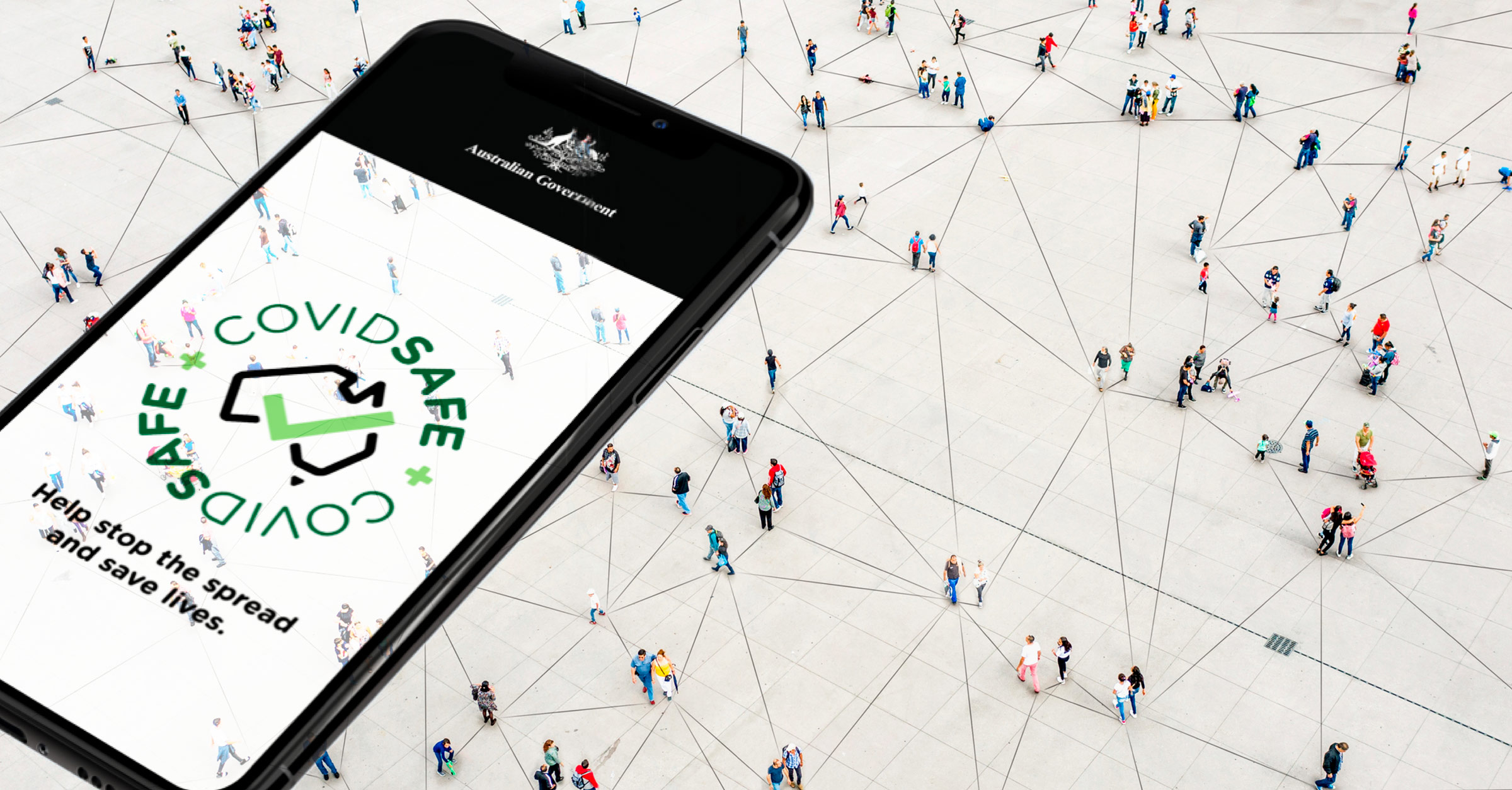
Recognising the social, civil and governance impact of the COVID19 crisis, COVIDSafe: Perceptions and Practices highlights how Australian’s are understanding and responding to these changes at a community and personal level.
We want to hear your voice.
This research project responds to the shifting environment of COVID19, exploring questions as they emerge. Questions include:
• From government contact tracing through the COVIDSafe app, to more informal practices such as details at cafes and restaurants, how do Australians respond to their information and locations being monitored and recorded?
• With the emergence of new norms in public space such as mask wearing and social distancing, how have people adjusted to differing understandings of civic responsibility toward public health?
• How is ethnicity, age and background informing responses to public health messaging?
• To what extent do individuals perceive the COVID-19 crisis as bringing about community solidarity. Or, alternately, bringing to the fore existing inequalities?
Against the backdrop of the COVID-19, this research seeks to understand how we negotiate, trust and relate to the government, the community and each other.
You can find out more details about the research through this Participant Information Sheet.
If you are in anyway struggling during the COVID19 crisis, there are a range of free services and support available that can assist you or a loved one at this time that you can access here.
If you would like to get involved with this project, fill out the form below or reach out to project leaders via the contact info provided alongside each bio.
People
Larissa Hjorth
Distinguished Professor and Director, Design and Creative Practice
School: Enabling Capability Platforms
Larissa Hjorth is a digital ethnographer, artist, Distinguished Professor and director of the Design & Creative Practice ECP platform at RMIT University. With Professor Heather Horst, she co-founded the Digital Ethnography Research Centre (DERC). Previously, Hjorth was Deputy Dean, Research & Innovation, in the School of Media & Communication (2013−2016). Hjorth served on the inaugural Australian Research Council (ARC) Engagement & Impact Pilot study assessment panel for humanities and creative practice.
Hjorth studies the socio-cultural dimensions of mobile media and play practices in the Asia-Pacific region with an emphasis on interdisciplinary, collaborative and cross-cultural approaches. She has published a dozen co-authored books, edited over a dozen Handbooks/Companions and has over 40 journal articles.
More recently, Hjorth’s work has become concerned with how we can bring creative, social and design solutions to the growing ageing populations and, in turn, how we might consider scenarios of what it means to die well. She is also studying how our “more-than-human” companions can teach us about new media in everyday life. Hjorth’s last book, Haunting Hands (Oxford Uni Press) looked at how mobile media is being deployed in situations of grief and trauma, her previous book explored how art practice can teach us new acumen into the climate change debate.
Hjorth’s books include Haunting Hands (with Cumiskey 2017), Screen Ecologies (with Pink, Sharp & Williams 2016), Digital Ethnography (Pink et al. 2016) Mobile Media in the Asia-Pacific (2009), Games & Gaming (2010), Online@AsiaPacific (with Arnold 2013), Understanding Social Media (with Hinton 2013), and Gaming in Locative, Social and Mobile Media (with Richardson 2014).
Hugh Davies
Postdoctoral Research Fellow
School: Games
Hugh Davies is an artist, curator and researcher of games and play. His practice explores histories of media devices and cultures of games in the Asia Pacific Region. Awarded a PhD in Art, Design and Architecture from Monash University in 2014, Hugh’s studies in game cultures have been supported with fellowships from Tokyo Art and Space, M+ Museum of Visual Culture and the Hong Kong Design Trust. Hugh is currently a postdoctoral research fellow at RMIT in Melbourne, Australia.
Ingrid Richardson
Professor
School: Media and Communication
Professor Ingrid Richardson has been teaching, supervising and researching in the fields of digital media, mobile media and games for over twenty years. She has a broad interest in the human-technology relation and has published widely on the phenomenology of games and mobile media, digital ethnography and innovative research methods, the relation between technology use and wellbeing, and the cultural effects of urban screens, wearable technologies, virtual and augmented reality, remix culture and web-based content creation and distribution. Ingrid has led or co-led 14 funded research projects, the most recent being an ARC DP [Games of Being Mobile] with Larissa Hjorth. She is contributing co-editor of Studying Mobile Media (Routledge, 2011) and co-author of Gaming in Social, Locative and Mobile Media (Palgrave, 2014), Ambient Play (MIT, 2020), Understanding Games and Game Cultures (Sage, 2020), Exploring Minecraft: Ethnographies of Play and Creativity (Palgrave, forthcoming), and Mobile Media and the Urban Night (Palgrave, forthcoming). Ingrid brings ten years’ experience in university-level HDR management and during this time has actively championed and supported creative methods and practice-led postgraduate research. Over the past five years she has also developed a passion for teaching critical web literacy skills to undergraduate students across all disciplines.
Ruth De Souza
VC Research Fellow
School: School of Art
Dr Ruth De Souza (FACN) is a Vice-Chancellor’s Fellow at RMIT, based in the School of Art and DCP Research Platform. She is a nurse, academic and a community-engaged researcher in gender, race, health and digital technologies. Ruth’s Fellowship will engage health professionals in finding new ways to understand, co-design and implement sustainable cultural safety initiatives in a range of health contexts in response to health inequities.
Prior to moving to Australia in 2013, Ruth worked at AUT University where she taught in the School of Nursing, led the Bachelor of Health Promotion, and was a Senior Research Fellow at the Centre for Asian and Migrant Health Research. Since her arrival in Australia, Ruth has undertaken a wide range of roles, including leading an undergraduate nursing program at Monash University’s Berwick campus; spearheading a unique community-engaged joint research appointment with North Richmond Community Health exploring how wearables and other digital technologies are perceived by people from culturally and linguistically different backgrounds and co-ordinating an interdisciplinary Data Systems and Society Research Network across the University of Melbourne. Ruth has also investigated the applicability of cultural safety in Australia, working closely with The Congress of Aboriginal and Torres Strait Islander Nurses and Midwives (CATSINaM), presenting at their National Professional Development Conferences and delivering training on cultural safety. She has also undertaken a two-year cultural safety project with cohealth (a not-for-profit community health organisation) and Our Watch who work for the primary prevention of violence against women and their children.
Mark Andrejevic
Professor
School: Media, Film, and Journalism
Mark Andrejevic (Professor, School of Media, Film, and Journalism, Monash University) contributes expertise in the social and cultural implications of data mining, and online monitoring. He writes about monitoring and data mining from a socio-cultural perspective, and is the author of three monographs and more than 60 academic articles and book chapters. He was the Chief Investigator for an ARC QEII Fellowship investigating public attitudes toward the collection of personal information online ($390,000; 2010 – 2014).
Andrejevic has experience conducting both quantitative and qualitative research and is experienced in the focus group and interview methodologies. His work on the personal information project, for example, generated a book, 11 articles and book chapters, and a report on Australian attitudes toward online privacy that was launched by the Federal Privacy Commissioner.
Creative Citizenship
New ways to connect young people to the world
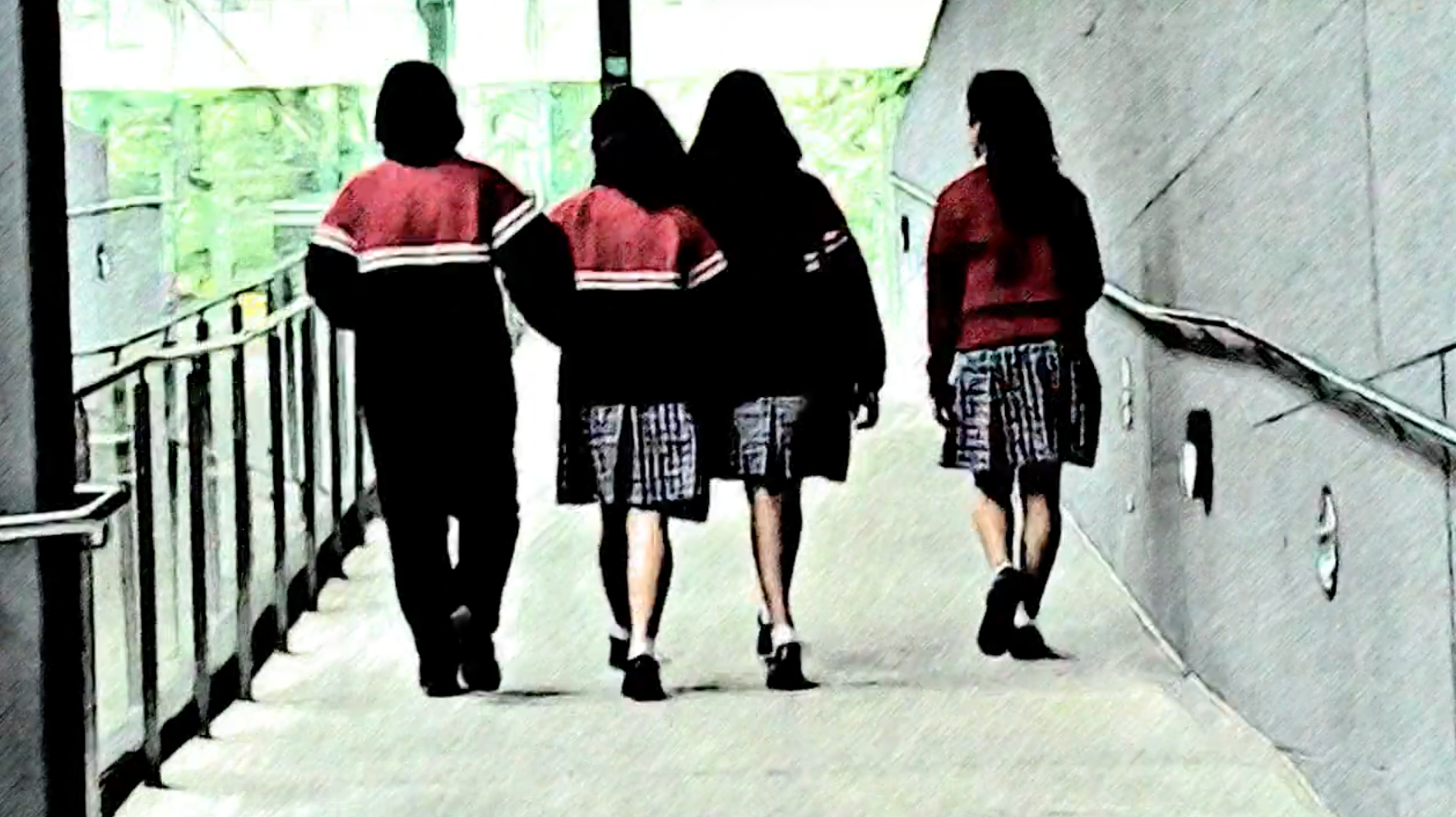
Creative Citizenship, in partnership with local cultural organisations, is encouraging youth to learn in inspiring environments.
The project explores:
— learning outside of the classroom;
— social inclusion through youth-generated teaching and learning materials; and
— improving digital literacies and social capital of young people through the creative exchange.
Visit the Creative Citizenship website.
If you would like to get involved with this project, fill out the form below or reach out to project leaders via the contact info provided alongside each bio.
People
Anne Harris
Associate Professor and Principal Research Fellow, Design and Social Context
School: Education
+61 3 9925 4459
RMIT staff profile
anne.harris@rmit.edu.au
Dr Anne M. Harris, PhD is an Associate Professor and Vice Chancellor’s Principal Research Fellow at RMIT University, and an Australian Research Council Future Fellow (2017 – 2021) studying intercultural creativity. Anne is an Honorary Research Fellow at University of Nottingham (UK) and an Adjunct Professor at Monash University (Australia).
Their research is in the areas of gender, creativity, diversity, performance and emerging digital ethnographies. Anne is a native New Yorker and has worked professionally as a playwright, teaching artist and journalist in the USA and Australia. They have authored or co-authored over 60 articles and 13 books on creativity, arts, and non-dominant culture formations, the latest being Queering Families/Schooling Publics: Keywords (with Stacy Holman Jones, Sandra Faulkner, and Eloise Brook, Routledge 2017). Anne is the creator and series editor of the Palgrave book series Creativity, Education and the Arts, and recently completed an Australian Research Council DECRA on the commodification of creativity.
Creative Ecologies
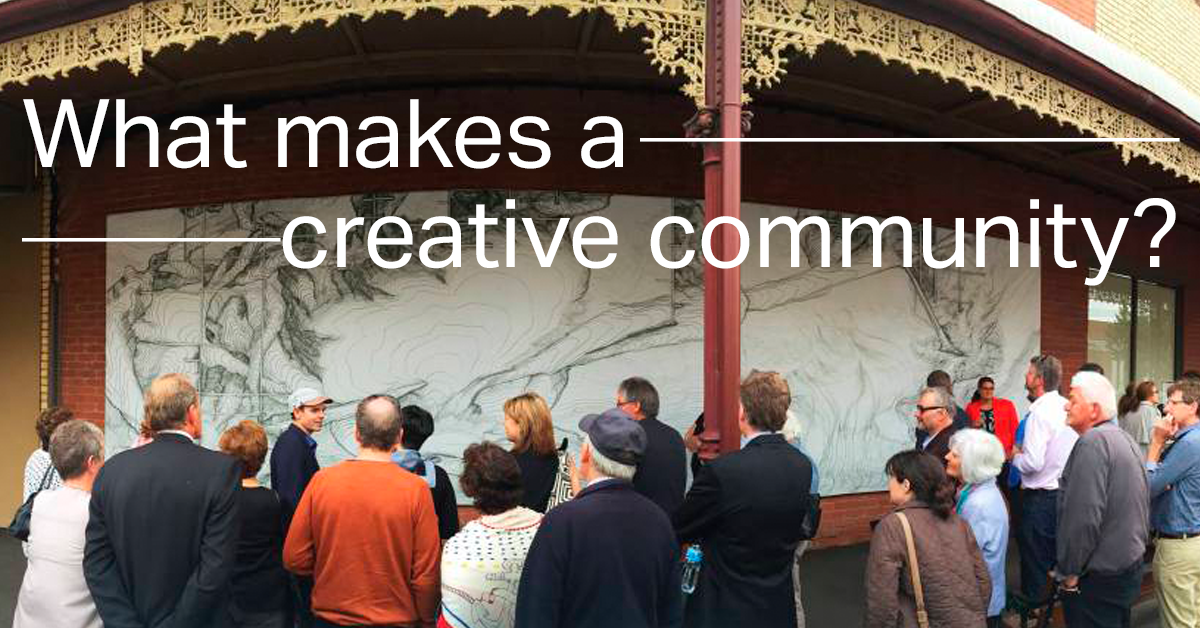
Creative Ecologies is a collaborative investigation into what makes Australia’s creative landscapes tick. The aim is to understand what it takes to build thriving creative communities and then develop tools to foster their growth.
The goal of the project is to develop a simple way of articulating the complex ways creative ecologies operate. Core to this will be highlighting connections to the wider society and demonstrating value beyond purely economic indicators. The long-term ambition of Creative Ecologies is to expand our understanding and appreciation of creative exertion – and have its central place in Australia’s national character recognised. It will do this by developing and raising awareness of a framework and resource for policymakers, practitioners and advocates. This will be a live, interactive visual map of the nation’s creative ecologies, combining data, case studies and avenues for connection across the sector.
The project began in late 2017 and the arising work and findings including a national survey, one-on-one consultations, interactive workshops were presented at the Engaging For Impact conference in February 2018. Creative Ecologies now has an expanded list of RMIT researchers on board
LEAD RESEARCHER
○Jan van Schaik, Senior Lecturer, School Architecture & Urban Design
SUPPORTING RESEARCHERS
○Marnie Badham, Vice Chancellor’s Postdoctoral Fellow, School of Art
○Bronwyn Coate, Senior Lecturer, Economics, Finance and Marketing
○Gretchen Coombs, Postdoctoral Fellow, DCP ECP
○Christine Phillips, Senior Lecturer, Architecture & Urban Design
○Professor Jason Potts, Economics, Finance and Marketing
○Noel Waite, Senior Lecturer, Communication Design
○ Professor Ellie Rennie, Digital Ethnography Research Centre
○Professor Mark Sanderson, Computer Science and Information Technology
You can find out more about CREATIVE ECOLOGIES here.
If you would like to get involved with this project, fill out the form below or reach out to project leaders via the contact info provided alongside each bio.
People
Jan van Schaik
Senior Lecturer
School: Architecture and Urban Design
Jan van Schaik is a practising architect at MvS Architects, a researcher and senior lecturer at RMIT Architecture & Urban Design, and a creative and cultural industries strategist at Future Tense. His is the leader of the ‘Culture and Society’ research stream, and a PhD superrvisor of established architects conducting post-professional reflective practice research. Jan is the founder of the WRITING & CONCEPTS lecture and publication series which reflects of the role that writing plays in visual arts practice. Jan is also one of the founders of Creative Ecologies„ a collaborative investigation into what makes Australia’s creative landscapes tick. The aim is to understand what it takes to build thriving creative communities and then develop tools to foster their growth.
Social Play Tool Kit
Encouraging social play and games literacies in the classroom.
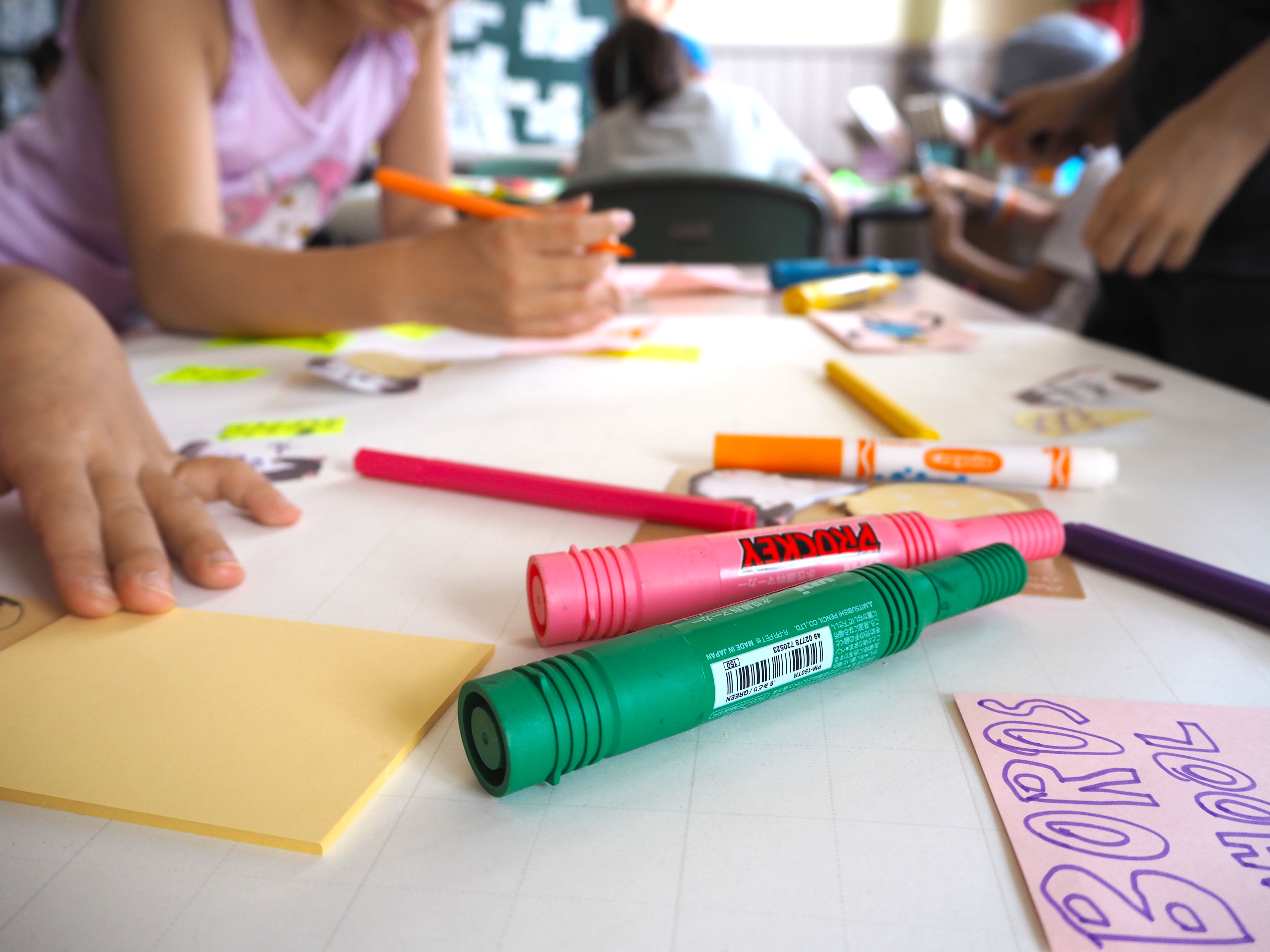
Play is a source of culture, a form of expression, and a creative way of engaging with the world. It is a crucial human ability for adaptation and expression.
In collaboration with our research partners and young people, we have developed a Social Play Tool Kit that encourages social play and game literacies in the classroom. Exploring socially-engaged gameplay and creativity across digital and material contexts, these tools are freely downloadable PDF’s for use in a variety of Primary School age learning environments.
INTRODUCTION TO THE SOCIAL PLAY PROJECT
If you would like to get involved with this project, fill out the form below or reach out to project leaders via the contact info provided alongside each bio.
People
Larissa Hjorth
Distinguished Professor and Director, Design and Creative Practice
School: Enabling Capability Platforms
Larissa Hjorth is a digital ethnographer, artist, Distinguished Professor and director of the Design & Creative Practice ECP platform at RMIT University. With Professor Heather Horst, she co-founded the Digital Ethnography Research Centre (DERC). Previously, Hjorth was Deputy Dean, Research & Innovation, in the School of Media & Communication (2013−2016). Hjorth served on the inaugural Australian Research Council (ARC) Engagement & Impact Pilot study assessment panel for humanities and creative practice.
Hjorth studies the socio-cultural dimensions of mobile media and play practices in the Asia-Pacific region with an emphasis on interdisciplinary, collaborative and cross-cultural approaches. She has published a dozen co-authored books, edited over a dozen Handbooks/Companions and has over 40 journal articles.
More recently, Hjorth’s work has become concerned with how we can bring creative, social and design solutions to the growing ageing populations and, in turn, how we might consider scenarios of what it means to die well. She is also studying how our “more-than-human” companions can teach us about new media in everyday life. Hjorth’s last book, Haunting Hands (Oxford Uni Press) looked at how mobile media is being deployed in situations of grief and trauma, her previous book explored how art practice can teach us new acumen into the climate change debate.
Hjorth’s books include Haunting Hands (with Cumiskey 2017), Screen Ecologies (with Pink, Sharp & Williams 2016), Digital Ethnography (Pink et al. 2016) Mobile Media in the Asia-Pacific (2009), Games & Gaming (2010), Online@AsiaPacific (with Arnold 2013), Understanding Social Media (with Hinton 2013), and Gaming in Locative, Social and Mobile Media (with Richardson 2014).
The Spatial Capability Cluster at RMIT (SCCAR)
Phase 2
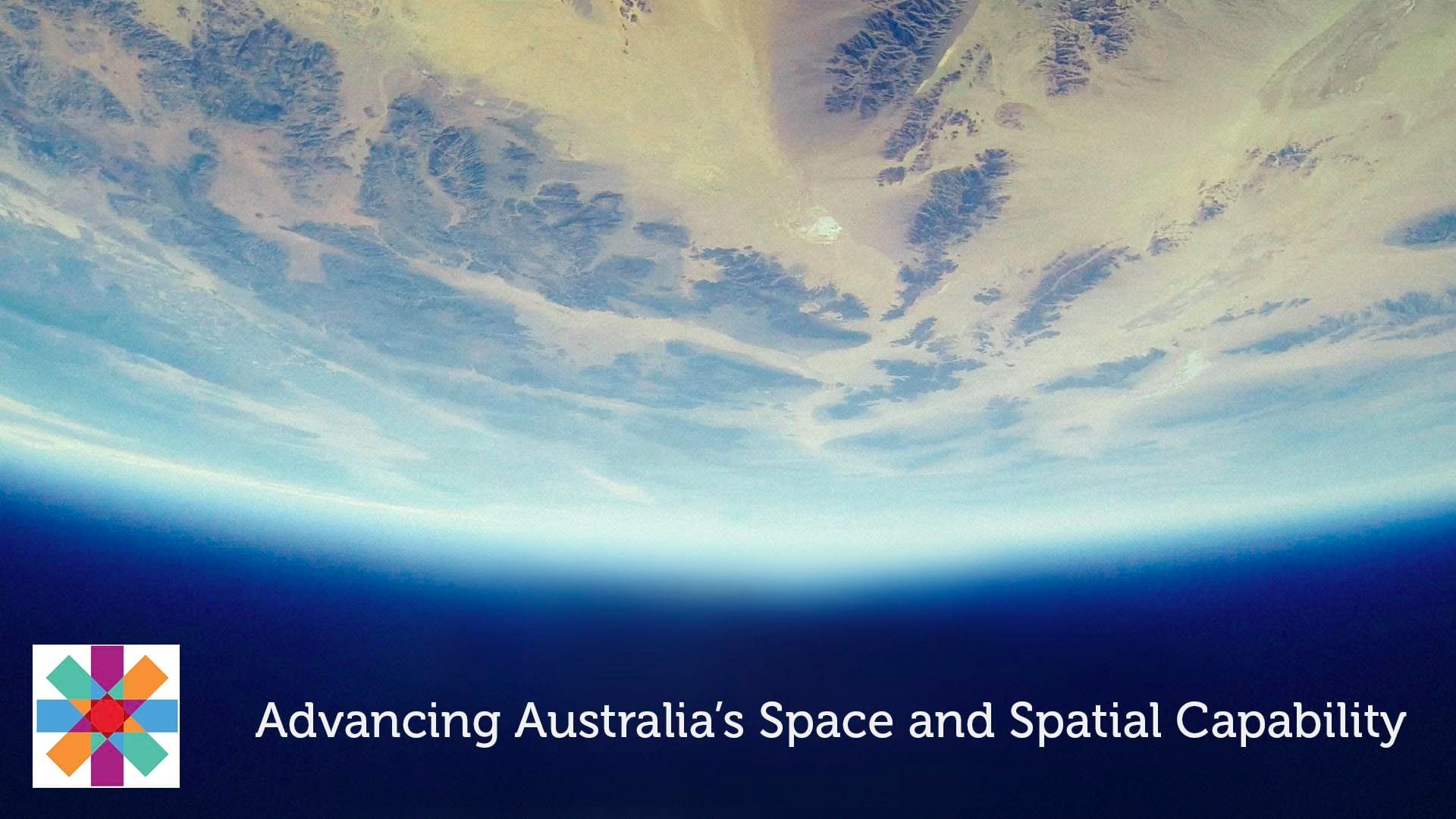
The SASCCAR project is working to establish a “Space and Spatial Capability Cluster” at RMIT. The cluster aims to provide a sustainable and interdisciplinary community of practice in “space” and “spatial”, bringing together spatial experts across RMIT University, and supporting early-career researchers and HDR students working in the spatial sciences. The cluster aims to enhance collaboration, increase the visibility of RMIT’s world-class expertise in spatial knowledge, and ultimately support relevant applications to large interdisciplinary funding schemes, including CRCs and Centres of Excellence.
Phase 2 of the SASCCAR project saw skills development workshops on mapping with Tableau; Frontier SI workshop; Workshop with Mark McMillan on Indigenous Knowledge of Place; Joint workshop with the Sir Lawrence Wackett Centre and defence industry (Textron) on major Next Gen Technology Fund application; as well as a presentation at the 2019 Engaging For Impact Event on Advancing Space and Spatial Capabilities with Dr Amanda Caples.
Space is a USD$345 billion global industry which has doubled over the previous decade, with strong growth expected to continue in the medium term. Australia’s Space and Spatial industries are undergoing a rapid change and growth including everything from rockets, satellites and sensors, through to the specialists who derive insights from space based information such as location data and satellite imagery. These diverse technologies are having more impact than ever across Australia’s economy, particularly our Agricultural, mining, environmental, health, transport, defence, and built environment industries.
You can find out more about the SASCCAR project here.
If you would like to get involved with this project, fill out the form below or reach out to project leaders via the contact info provided alongside each bio.
People
Matt Duckham
Professor
School: Geospatial Science
Matt Duckham is a Professor of Geospatial Sciences at RMIT University. At RMIT, he has occupied a number of senior leadership roles including: Acting Dean STEMM Diversity and Inclusion, Associate Dean of Geospatial Science, and Deputy Head of the School of Mathematical and Geospatial Sciences, Science Director for the CRC for Spatial Information (CRCSI) Rapid Spatial Analytics Program. Prior to joining RMIT, Matt was Professor in Geographic Information Science within the department of Infrastructure Engineering at the University of Melbourne, when he also held a visiting Professor position and the University of Greenwich.
Matts research focuses on the area of Geographic Information Science, particularly distributed and robust computation and visualisation with uncertain spatial and spatiotemporal information, within the domain of mobile, location aware and sensor enabled systems. He has taught a range of undergraduate and postgraduate courses in connection with spatial computing, in particular, spatial visualisation and spatial databases.
News and updates
EFI Conference 2018
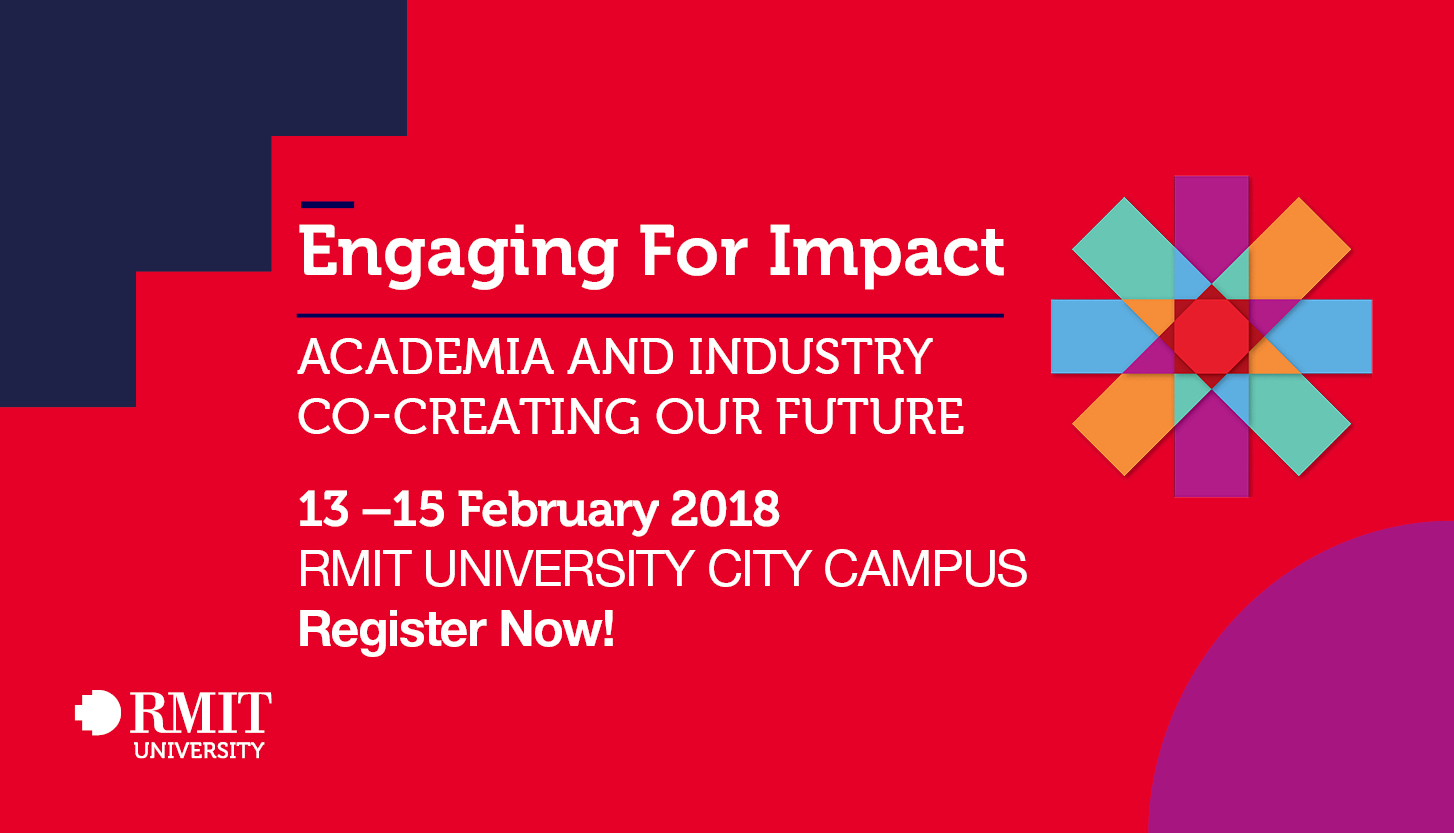
At Engaging for Impact 2018 Conference, RMIT’s eight Enabling Capability Platforms will share their knowledge and demonstrate how their expertise can address the world’s most critical issues. The Social Change ECP and Design and Creative Practice ECP, along with Biomed ECP, have curated The Future of Care stream. Read more
HDR HIGHLIGHT: Caitlin McGrane
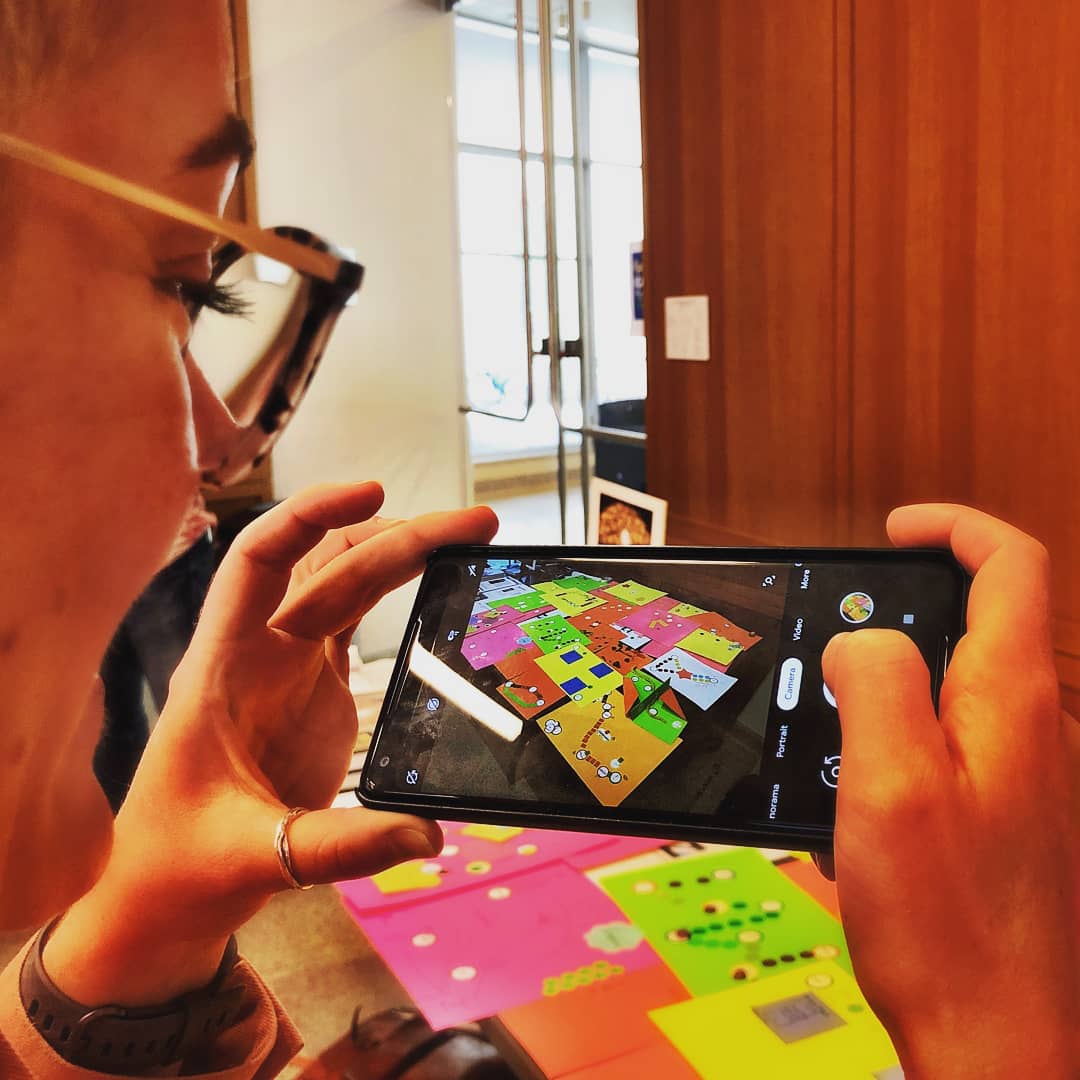
Caitlin McGrane
PhD candidate in the Digital Ethnography Research Centre Read more
People
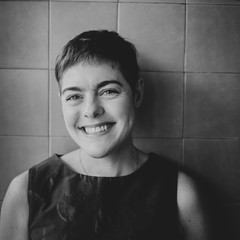
Caitlin McGrane is a feminist researcher and activist. Her doctoral research investigates how women’s feelings about their smartphone uses and practices can help challenge normative and misogynistic notions of women’s communications. She leads Gender Equity Victoria’s (GEN VIC) ‘Enhancing Online Safety for Women’ project advocating for better support and conditions for women working in media. In 2018 – 2019 she worked with GEN VIC to design a toolkit and a series of videos encouraging prosocial bystander actions on social media. She has worked on projects with the Victorian Trades Hall Council Women’s Team building an online resource to supplement their Gender-Based Violence in the Workplace training package. Her previous research has explored how witnessing anti-feminist harassment can negatively affect individuals’ willingness to publicly identify as feminist and participate in online spaces.
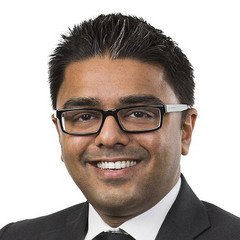
Hardik Bhimani is a PhD student in the School of Economics, Finance and Marketing and is concurrently completing a Graduate Diploma in Psychology at Monash University. Hardik holds a Masters in Applied Finance from Kaplan Business School (Sydney) and is a member of the prestigious Strategic Management Society.
“Managers face many strategic decisions but they often make unsustainable choices. So the challenge for todays’ firms is – how to effectively make social, environmental and economic choices?”
Prior to joining RMIT, where Hardik currently teaches Strategic Management courses, he was an award winning strategist and subject matter expert at several multinational organisations. It was during this period that he cultivated a curiosity for behavioural strategy. Ultimately, the quest to advance his research found him a ‘home’ at RMIT University’s Behavioural Business Lab.
“The access to supportive supervisors and a team of like-minded critical thinkers means the research journey is not only pleasant, but also engaging.”
Hardik’s research aims to understand the micro foundations of the interplay between social, environmental and economic strategic choices. His mixed-method research takes a behavioural strategy perspective and explains psychological influences, which affect strategic decision-making. In turn, the findings could guide managers’ to effectively de-bias their decision-making process, for a more sustainable strategic choice.

Currently undertaking a PhD in Design at RMIT School of Design, Jacob explores socially engaging technology in later life and its shaping by designers. Approaching design research through investigating the materiality of artifacts, and our interactions with them, Jacob seeks to uncover social-technical practices through dialogical and anthropological means.
Alongside his doctorate research, Jacob is involved in ‘Co-designing Participatory Strategies With Older Adults ‘ (Shaping Connections) and ‘Enabling an Ageing Workforce’ (Safeness by Design) research projects. As a sessional lecturer in Design Studies, Jacob hopes to foster research-led and collaborative design practices in socially complex contexts. With a diverse background in the design industry, he is interested in locating design research practice in wider discourses and interrogating its impact.
